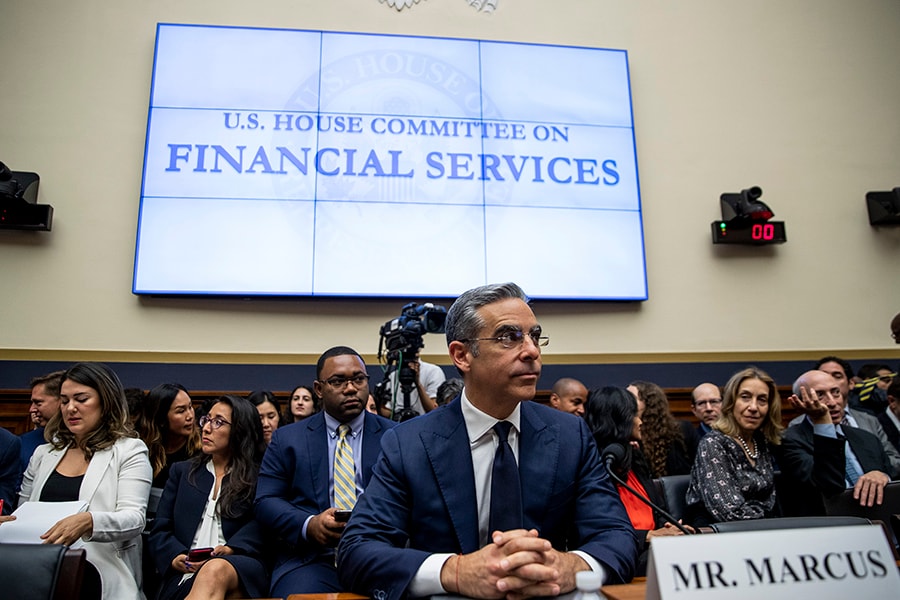
Facebook's cryptocurrency faces second day of critical hearings
The company's plan to introduce Libra, a digital currency, is dogged by its own reputation and scepticism of the legal use of cryptocurrencies

Lawmakers said in a House hearing Wednesday that Facebook’s plan to enter the world of cryptocurrency and global finance could threaten sovereign currencies or even destabilize governments.
A day after a similarly critical Senate hearing, it was the House Financial Services Committee’s turn. David Marcus, a Facebook executive, faced over four hours of questions about Facebook’s plans for a cryptocurrency called Libra. As was the case Tuesday, Marcus was dogged by his company’s controversial reputation as well as skepticism of the legal uses of cryptocurrencies.
“This is the biggest thing this committee will deal with this decade,” said Rep. Brad Sherman, D-Calif. “This is a godsend to drug dealers and tax evaders.”
When Facebook announced Libra in June, it said it wanted to create a new global financial system. The initiative, if successful, could put digital wallets in the hands of the more than 2 billion people who use Messenger and WhatsApp, the messaging platforms owned by Facebook.
The antagonism toward Facebook’s Libra effort is part of a broader escalation of criticism of tech giants in Washington, which was on full display in a series of hearings Tuesday. Even before Facebook announced its intentions to move into the financial system, the company had battled concerns that it had grown too powerful.
“I think before you move on to Libra, you ought to clean up the messes of the past,” Rep. Madeleine Dean, D-Pa., said at the hearing.
Libra also faces doubts from regulators around the world. On Wednesday, the chief economist of the International Monetary Fund, Gita Gopinath, told reporters that she was concerned that Libra could unfairly increase the influence of the dollar in the global economy while also making money laundering easier, according to a Reuters report.
While the Senate hearing about Libra on Tuesday focused on the widespread mistrust of Facebook, House committee members showed more interest in the many practical hurdles that are likely to confront Facebook if it wants to release Libra next year, as it has said it wants to do.
“Facebook’s plans raise serious privacy, trading and monetary policy concerns,” said Rep. Maxine Waters, D-Calif., chairwoman of the committee. The system will “yield immense economic power that could destabilize government.”
Waters said she was working on new legislation that would make it illegal for big tech companies to get involved in the financial industry, which could stop Libra in its tracks.
Marcus, the executive overseeing Calibra, the Facebook subsidiary working on the project, struck a conciliatory tone for a second day and said Facebook was listening to its critics.
“I believe we are owning these mistakes and working to remedy them,” he said.
Republicans on the committee were more eager to talk about the benefits that might come from Libra, but they also expressed their concern about Facebook’s plan.
“Quite frankly, I don’t care for Facebook,” said Rep. Barry Loudermilk, R-Ga. “But I do appreciate anyone who challenges the status quo.”
Several Republicans asked if Facebook could stop people from using Libra in the way that it has closed the accounts of controversial political figures like conservative commentator Milo Yiannopoulos.
“I don’t know,” Marcus said, emphasizing the basic uncertainties that still face the currency.
Facebook has designed Libra so it can be governed by dozens of big corporate partners, organized through a Swiss nonprofit. This is supposed to reduce Facebook’s power over the currency, but it led to questions Wednesday about how much power U.S. regulators would have if governance of the system was not taking place in the United States.
Facebook has said that Libra would be backed by several different traditional currencies, held in bank accounts. House committee members expressed concern that this could expose consumers to the risks of currency fluctuations, and might reduce the power of the dollar.
“Tell me how Libra will not undermine sovereign currencies and central banks, or is the very point to undermine central bankers and to provide a greater freedom away from central banking?” asked Rep. Andy Barr, R-Ky.
Marcus argued that Libra was not an attempt to take on traditional currencies or the Fed.
“I want to be very clear, we do not want to compete with the dollar or sovereign currencies,” Marcus said at the hearing.
But Marcus also did not back down on Libra’s big ambitions: “We would like for Libra to be a digital, global currency, and to be one unit of digital currency for the whole world.”
©2019 New York Times News Service




